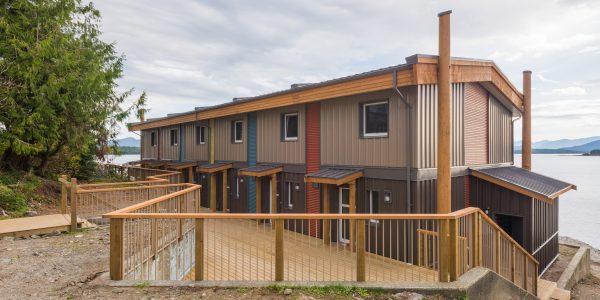Bella Bella ‘Passive’ staff housing cited as carbon neutral success in government report
Vancouver Coastal Health’s staff housing project in Bella Bella was included in the recently released Carbon Neutral Government Year in Review 2015 report. According to the report, B.C. has achieved carbon neutrality across its provincial public sector for the sixth consecutive year. Bella Bella’s staff housing project made it into the report thanks to its high quality, energy-saving features that will save VCH significant operational costs in the long-term.
Below is the excerpt on Bella Bella’s staff housing in the 40-page report:
Vancouver Coastal Health Authority
Passive House project in Bella Bella, B.C.
In the fall of 2014, a fire damaged the staff housing complex for R.W. Large Memorial Hospital in Bella Bella, B.C. on the mid-coast. Vancouver Coastal Health decided to build a new staff housing complex and take advantage of new building technology by building a modular structure to the Passive House standard.
Passive House buildings typically consume about 80 percent less energy than traditional construction due to an ultra-efficient building envelope that stays cool in summer and warm in winter. This technology becomes much more significant in remote communities like Bella Bella, which burn diesel fuel to generate electricity, producing far more GHG emissions than typical hydro gridconnected communities in B.C.
The project team assembled the modular units in Agassiz, B.C., shipped them by barge 700km up the coast to Bella Bella and finished assembly on site. The project was completed at a cost of $2.6 million – about $500,000 less than it would have cost to construct the development on site (due to the remote location). On the coldest day of the year, each unit in this complex will have a peak heating load of about 600 watts. This means that the entire unit is heated with the equivalent of the heat generated from six 100-watt light bulbs. No additional heating (such as a furnace or boiler) is required. All the air in the building is replaced every three hours or less, and 92 percent of the heat in that air is recovered and transferred to fresh air. Thanks not only to insulation, but also very careful attention to sealing and ventilation, the heat of the sun – or even the body heat of the people inside – is enough to keep a Passive House comfortable year-round.
This innovative project demonstrates that high quality, energy efficient buildings can be made to work in remote communities, resulting in extremely low energy consumption and much higher building quality than often exists in smaller remote communities. On a long-term basis, this building will use 75 percent less energy and produce 80 percent fewer GHG emissions than a similar sized standard construction building, thereby saving Vancouver Coastal Health significant operational costs for this location.
Click here to read the full report.

